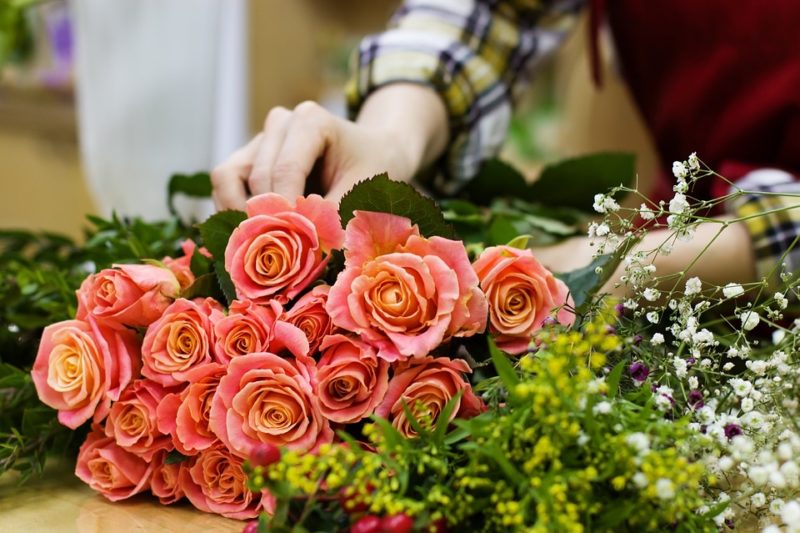You must know who pays for wedding flowers, including the bridal bouquet and the arrangements worn and displayed. That being said, the wedding flower sponsors can either be the bride’s family, the groom’s family, or the couple themselves.
So if you’re either one of these people, we recommend that you familiarize yourself with how much to tip the wedding florist. Proper etiquette with wedding vendors should always be practiced.

Who Pays For Wedding Flowers Traditionally?
Bride’s parents
Traditionally, most wedding budgets are shouldered by the bride’s family, specifically, the bride’s parents. That being said, the wedding flowers are included in the elements they’ll shoulder, or at least, most of the costs attributed to the wedding flowers.
For example, the bride’s parents can pay for the wedding ceremony and reception arrangements, while another person or group of people can sponsor the smaller flowers. However, even if it’s what tradition dictates, never assume that the bride’s parents will automatically pay for the wedding flowers.
There are different financial capacities per family, so to avoid misunderstandings, ask your parents for their approval before ordering the flowers. You can also read how to ask parents for money for the wedding and buy most wedding flowers yourself.
Groom’s parents
While the bride’s parents are traditionally expected to pay for most of the wedding expenses, the floral needs for the event can also be shouldered by the groom’s parents. Or, if not all of the wedding flowers, the groom’s parents can pay for some special floral arrangements.
For example, the groom’s family usually covers the costs of the rehearsal dinner and the needs of the groomsmen and the groom himself. Therefore, the flower arrangements for the rehearsal dinner and the boutonnieres worn by the groom and his groomsmen can be paid for by the groom’s parents.
At some weddings, both families of the people getting married can also discuss their finances. For example, perhaps the two families will split the total wedding flower costs.
The couple/ either the bride or groom
When planning the wedding, the couple can conclude that they’ll be covering all the costs for the event. That being said, it’s possible that the couple will pay for their wedding flowers and their respected families won’t shoulder them.
The flowers can also be covered by one person only, whether it’s just the bride or groom, depending on their setup for the wedding budget. The flowers can be their gifts to each other, where the bride can pay for the groom’s floral needs and the groom pays for the bride’s floral needs.
If this type of arrangement regarding who pays for the wedding flowers is what works for you, be sure to communicate all your expectations to your partner. Be honest in the amount you can contribute and adjust accordingly.
What Flowers Does The Groom’s Family Pay For?
The following are traditionally expected from the groom’s side, but feel free to adjust and modify based on your financial capabilities:
- Bridal bouquet
- Groom and groomsmen boutonnieres
- Rehearsal dinner floral arrangements
- Mothers’ and grandmothers’ nosegays or corsages
- Flowers wore on the groom’s side of the family
What Flowers Does The Bride’s Family Pay For?
The following are traditionally expected from the groom’s side, but feel free to adjust and modify based on your financial capabilities:
- Flower decors, arrangements, and centerpieces for the wedding ceremony and reception
- Bouquets held by the bridesmaids
- Other wedding bouquets
- Flowers needed by the flower girls
Since the bride’s family pays for most wedding flowers, please read about how much are wedding centerpieces as they are the priciest.
Who Pays For The Bridesmaid’s Bouquet?
The bride’s family will be paying for the bouquets of the bridesmaids. And since the bridesmaids are wearing corsages at some weddings, the bride’s family will also be paying for those flower arrangements.
Nonetheless, no rule forces who pays for what in wedding flowers. The bride herself can even shoulder the floral bridesmaid’s needs.
Who pays for the corsages at a wedding?
The corsages are typically paid for by the bride’s family. However, the special corsages or nosegays for the mothers and grandmothers of the bride and groom can be paid for by the groom’s family.
Who pays for the boutonnieres at a wedding?
The groom’s family often shoulders the wedding boutonnieres. Remember that the groom and his groomsmen’s flower needs are covered by his parents.
But then again, the boutonnieres can also be paid for by the groom as his gift to his attendants.
Who Pays For Most Of The Wedding?
The bride’s family or parents are the traditional wedding hosts, which is also why they’re expected to pay for most wedding expenses. However, the groom’s family can also pay for the wedding, or the couple might have another generous sponsor that will treat them by paying for most of the wedding.
Conclusion
Was this etiquette guide helpful? To recap who pays for wedding flowers, it can be the bride or groom’s parents, but it’s also acceptable for the couple to pay for their floral wedding needs.
Like with other wedding expenses, there are no rules regarding who must pay for what. Communicate with your financial sponsors to know how to budget everything for the wedding.
